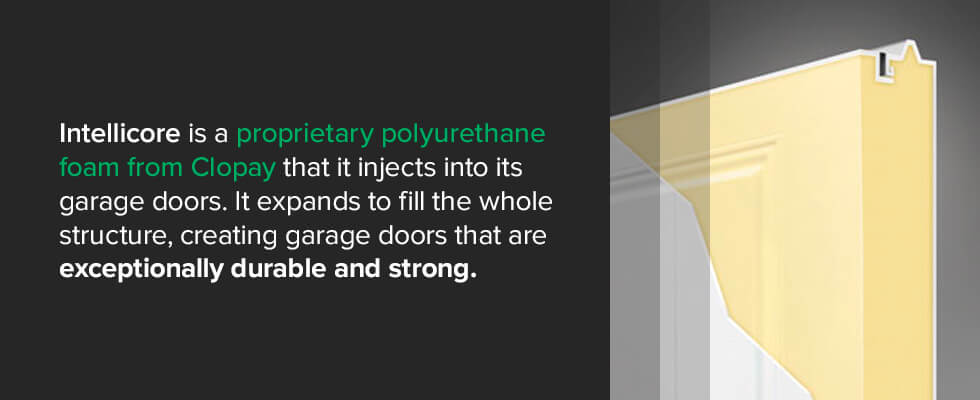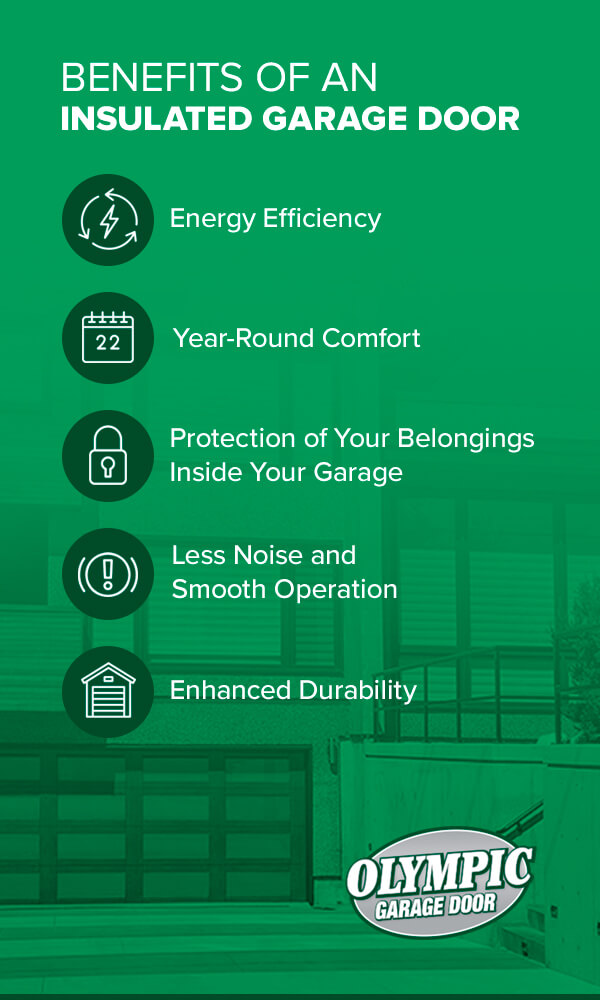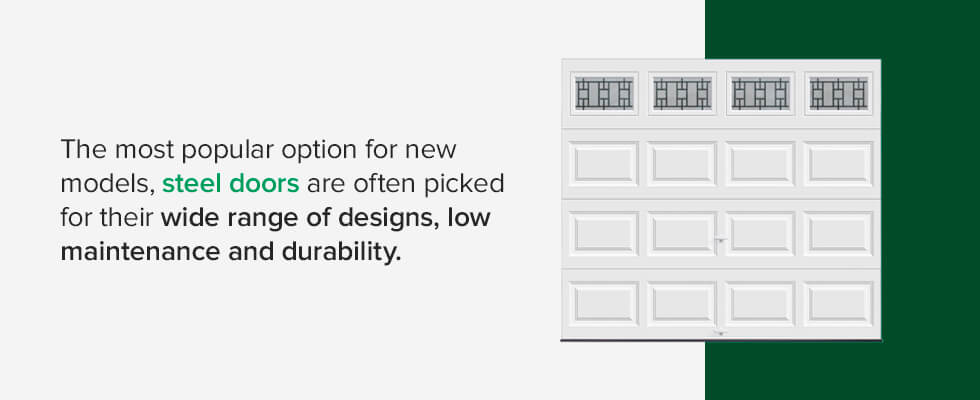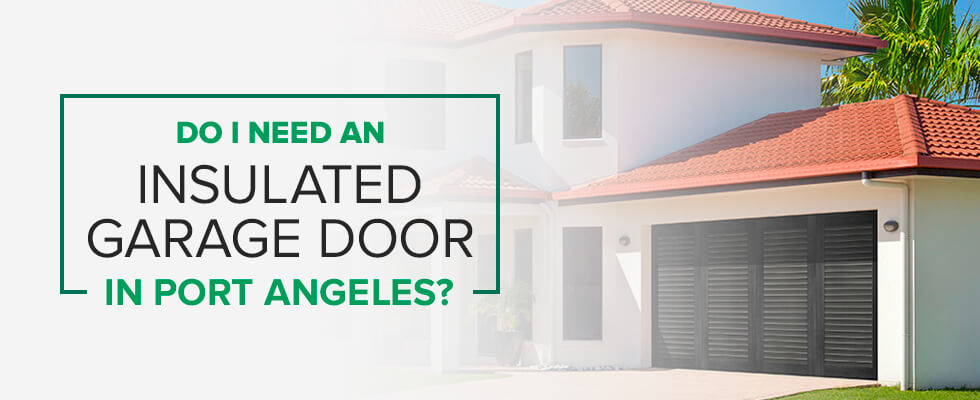Do I Need an Insulated Garage Door in Port Angeles?
If you live in or around Port Angeles — an area with a relatively temperate climate — you may be under the impression that an insulated garage door just isn’t necessary for your home. You may believe the only benefit of an insulated garage door is to help protect against extremely hot or cold weather outside, neither of which Port Angeles really has. However, the insulation inside a garage door actually provides many other benefits for homeowners, regardless of where they live.
This article compares the different types of garage door insulation and talks about the wide variety of benefits insulated garage doors provide.
- Types Of Garage Door Insulation
- R-Value Explained
- Benefits Of An Insulated Garage Door
- Are Insulated Garage Doors Worth The Cost?
- Choosing An Energy-Efficient Garage Door
- Areas To Insulate
- Get An Insulated Garage Door For Your Port Angeles Home
Types of Garage Door Insulation
There are two primary types of insulation found in garage doors: polystyrene and polyurethane.
1. Polystyrene
Polystyrene, a synthetic aromatic polymer, is made from styrene, a monomer that is more commonly known as Styrofoam. This is the brittle white material you commonly see in shipping boxes to protect the contents inside.
Polystyrene is pre-formed to the garage door panels and is generally attached inside the panels with glue. It fits better and retains its shape better than open-cell polyurethane over long periods and doesn’t deform, degrade or lose its insulating abilities.
However, polystyrene doesn’t fit as well in the corners of the door panels, leaving pockets of air. Furthermore, some manufacturers choose not to glue the polystyrene to the garage door panels, so it doesn’t help make the panels more rigid. Generally speaking, polystyrene does not insulate as well as polyurethane, which we’ll discuss next.
2. Polyurethane
Polyurethane, a polymer made of organic units connected by urethane links, is sprayed into every panel of a garage door, which creates a tight fit that makes the panels more rigid. Although more expensive than polystyrene, polyurethane doesn’t significantly increase the cost of an insulated garage door.

3. Intellicore (Clopay)
Intellicore is a proprietary polyurethane foam from Clopay that it injects into its garage doors. This foam, which expands to fill the whole structure, creates garage doors that are exceptionally durable and strong. This dense insulation also means that the door is quieter and has excellent insulating abilities, with R-values exceeding 20. We’ll explain what R-values are in the following section.
R-Value Explained
If you’ve been shopping around for garage doors, you’ve probably come across R-values and U-factors, both of which measure insulation.
1. R-Value
R-value measures how well a material can resist heat flow and it is determined by the material’s composition, density and thickness. The higher the R-value of a material, the more effective it is at insulating. When calculating the R-value of a multilayer installation, all you have to do is add the R-value of each layer.
Different insulation types can have different R-values. For instance, the R-value of a garage door with 2-inch thick polystyrene insulation is often different from one with 2-inch thick polyurethane insulation.
One common misconception about R-value is that insulation with an R-value of 16 is two times as effective as insulation with an R-value of 8, but this is not accurate. While an R-value of 16 is more effective than an R-value of 8, the difference is significantly less than twice.
2. U-Factor
U-factor is an alternative way to measure the amount of heat that is transferred through a material. Many manufacturers have started using U-factor because it takes into account every component of your garage door, including the hardware, panels and frame. If a door has a U-factor rating, you can be certain that the rating is for the whole door, not just the insulation itself.
U-factor measurements range from 0 to 1. Unlike R-values, a lower U-factor rating indicates higher, not lower, efficiency. So, a door with a 0.25 U-factor rating has better insulating ability than a door with a 0.50 U-factor rating.

Benefits of an Insulated Garage Door
While most of us associate an insulated garage door with the interior comfort it provides, we often fail to recognize the many other benefits it offers. These benefits include:
1. Energy Efficiency
Energy conservation advice tends to focus on the inside of the house, including more energy-efficient windows, better insulation and better heating systems. While these things are all important, these tips often overlook the garage, which some people don’t even consider a part of the home. However, as garages often connect to your house directly and have conditioned rooms over them, a well-insulated garage can significantly help with energy savings.
However, garages are usually not well-insulated by default. Since garages aren’t considered living spaces, the standards for building them aren’t the same as the rest of the house. Air leakage and gaps are allowed, which make the garage one of your home’s least insulated parts — and the conditioned air of your home can get out through your garage.
Installing an insulated garage door in your garage will help to moderate your garage’s temperature — even if the rest of your garage isn’t insulated.
While this doesn’t mean your garage will be the same temperature as the rest of your house, it does moderate the temperature in your garage — and these moderated temperatures will, in turn, lower how much energy is required to condition the rest of your home.
2. Year-Round Comfort
If you’re like many homeowners, you use your garage for more than just storing things and parking your vehicle. If you use your garage for work or play, it makes even more sense to invest in an energy-efficient door. By keeping your garage a more moderated temperature, it will be easier to use it for occasional activities.
Even if you’re only in your garage when traveling to and from your car, the added warmth that an insulated garage door provides can make a big difference. If you’re bringing in groceries or moving your kids from your vehicle to your house, it’s much more comfortable to do so if it’s warm.
3. Protection of Your Belongings Inside Your Garage
One of the greatest insulated garage door benefits is that it reduces the chance of your garage temperature dropping below freezing, which can help protect your vehicles. As you probably know, cold temperatures can negatively affect your car’s performance in many ways. Here are some examples of negative ways freezing temperatures can negatively impact your vehicle:
- They can shorten battery life or cause the battery to die.
- They can cause brake, engine and transmission fluids to thicken.
- They can lower the air pressure in your tires.
- They can cause wiring and spark plugs to become unreliable.
In short, the colder the temperature is, the greater the chance that your car won’t run properly.
Moderated temperatures can also extend the lifespan of other things in your garage. For example, substances such as paint, which are typically stored in garages, do not do well in extreme temperatures. Extreme cold or heat can change the paint’s consistency, often making it unusable. Motor oil, cleaning supplies and fertilizers often behave the same way when exposed to extreme temperatures.
4. Less Noise and Smooth Operation
Insulated garage doors tend to make much less noise than uninsulated ones. While quieter operation may not be the most important thing most homeowners look for in a garage door, it is a nice bonus.
If you have an uninsulated garage door that’s making noise, there are many possible causes, including loose chains, worn down rollers or poorly lubricated springs or hinges. However, if you’ve checked all these areas and found them not to be the source of the noisiness, it could be the panels on the garage door itself, especially if it is a lightweight door.
If there is a bedroom or other living space next to or above the garage, this noisiness can be a major disturbance. If your door makes a lot of noise, you may want to consider upgrading to an insulated model. The insulation will dampen the majority of the vibrations — and it can also help dampen sounds coming from outside, as well.
Another reason insulated doors are quieter is that they’re constructed more tightly. The panels consist of multiple layers sandwiched together tightly, meaning there aren’t many loose components to rattle. Furthermore, since they tend to weigh more than their uninsulated counterparts, they’re not as likely to vibrate or jolt on the tracks.
5. Enhanced Durability
Another benefit of an insulated garage door is added durability. When you think of all the reasons a garage door needs to be durable — after all, it needs to stand up to kids, equipment and cars — this extra durability makes a lot of sense.
Insulated doors today are often made with an aluminum or steel frame. Inside this frame is solid-core insulation sandwiched between steel panels — a construction style that creates an energy-efficient, lightweight door that’s considerably less susceptible to denting.
Older, uninsulated doors, by contrast, generally consisted of thin steel sheets wrapped over the frames of the panels. Without insulation, these panels were very susceptible to dents from cars, basketballs, bikes and other items commonly stored in the garage. They were also often scratched by wind-borne projectiles during storms. Insulated garage doors can better withstand all of these kinds of damage.
Are Insulated Garage Doors Worth the Cost?
When considering all the advantages of insulated garage doors, including increased security, durability, comfort and protection, insulated garage doors are worth it for almost any homeowner — no matter where they live.
If you live near a coastal area of the Olympic Peninsula, where the weather is fairly temperate, you may not need an insulated door for its temperature-moderating abilities. However, if you’d like a garage door that’s low maintenance, extremely durable and quiet, then an insulated garage door is a worthwhile investment.
Choosing an Energy-Efficient Garage Door
When buying an insulated garage door, you’ll want to consider several factors, including the material it’s made of and how many layers of insulation it contains.

Materials
The material of the garage door you choose is an important consideration, as it has a major impact on the door’s appearance, which in turn can enhance the curb appeal of your home.
Luckily, most garage doors can be insulated, regardless of the material they’re made of. If you want to buy an energy-efficient garage door, you’ll want to choose either a double-layer or triple-layer model.
- A single-layer door consists of just one layer and features no additional insulation.
- A double-layer door features one insulation layer, which is usually polystyrene.
- A triple-layer door features a thicker polyurethane or polystyrene insulation layer sandwiched between another material. This is the most energy-efficient of the three types.
If you opt for the single-layer garage door, the only insulation you’ll get is from the panel materials themselves, which generally provide minimal insulation.
If you choose a double-layer door or triple-layer door, most of the insulation will be provided by the polyurethane or polystyrene layers, meaning the finish you choose can be based on appearance rather than its heat-retaining properties.
Garage doors generally are of one of the following four material types:
- Steel: The most popular option for new models, steel doors are often picked for their wide range of designs, low maintenance and durability. The insulation they provide is moderate.
- Aluminum: A lighter alternative to a steel door, an aluminum garage door can provide your home with an updated, modern appearance. However, it doesn’t insulate well.
- Wood: Wood provides a classic, high-end look, but its insulating ability is not high. Those who opt for wood doors generally do so for their appearance.
- Composite wood: Although composite wood by itself is a poor insulator, composite wood is frequently layered on top of steel and insulation in multilayer doors. This is a great way to enjoy both energy efficiency and the classic look of wood garage doors.
Areas to Insulate
There are three primary areas of your garage that you should insulate. Keep in mind that this is for an ideal situation, and we understand that insulating all three areas is not feasible for all homeowners.
1. Garage Door
The simplest and most affordable place to insulate is the garage door. It only takes a couple of hours, and doing so will save you thousands on energy costs over the door’s lifetime. While we strongly recommend that every homeowner insulate their garage door, it is especially important if you have an interior wall that is connected to your garage.
2. Garage Walls
Insulating the walls of your garage will be a bit more complex and time-consuming. However, your garage may already be insulated since many areas legally require garages to have insulated walls, mainly because people often store combustible materials in garages and most garages don’t have smoke detectors.
However, adding insulation to the walls of your garage is something to at least consider, particularly if you have an interior wall connected to your garage.
3. The Ceiling
The ceiling of your garage is another important place to have insulation, especially if there is a living space directly above. Without insulation in the garage ceiling, the weather will affect the room above more, making it more uncomfortable.
However, keep in mind that insulating the ceiling of a garage is an ambitious project. You’ll need to consider several factors, including airflow and condensation buildup, which may result in mold. We strongly recommend you leave this project to a professional.
Get an Insulated Garage Door for Your Port Angeles Home
At Olympic Garage Door, we offer high-quality insulated garage doors in many different styles, ranging from carriage house designs to sleek contemporary models — and whatever you choose can be personalized to meet your specific needs and tastes. You can also rest assured that all of our doors are made with high-quality steel, aluminum or wood materials, meaning they’ll provide lasting efficiency, performance and durability.
If you live in Port Angeles, Port Townsend, Sequim or any other community in the surrounding area, Olympic Garage Door is the local business you want for all your garage door solutions. To request an estimate, don’t hesitate to reach out to us via our form.


